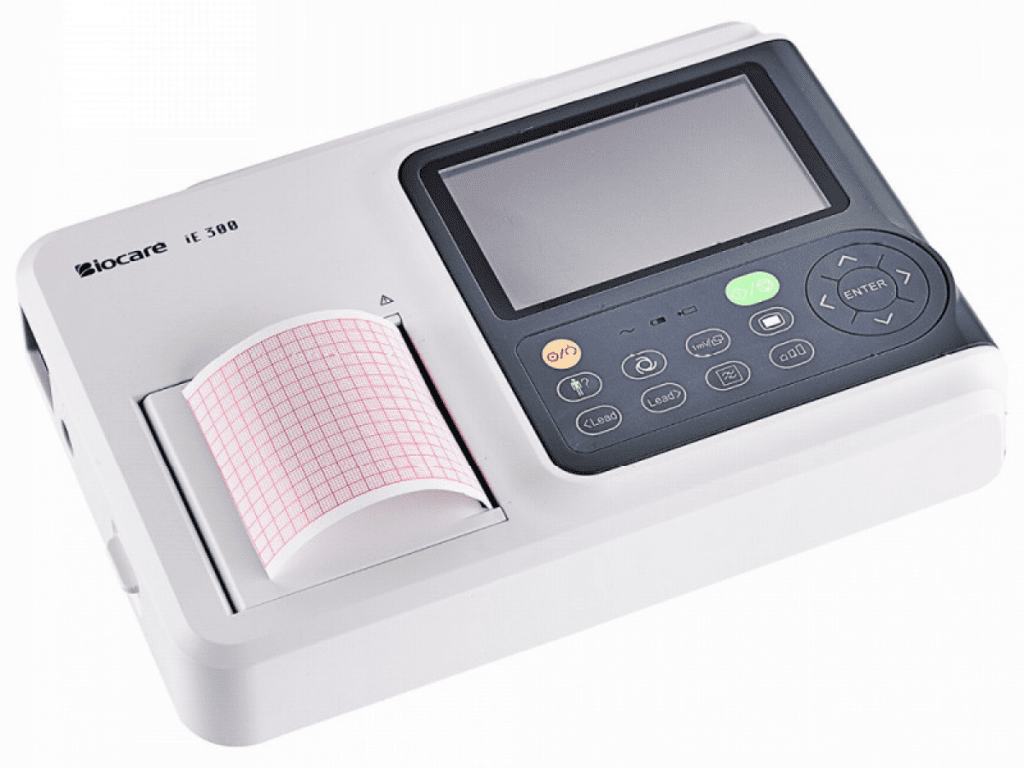ECG test at home
Yes, performing an ECG (electrocardiogram) at home with the right equipment is possible. Several consumer-grade ECG devices allow you to monitor your heart’s electrical activity from the comfort of your home. These devices are often compact and user-friendly, and they can connect to smartphones or computers to display and record your ECG data.
Some popular home ECG devices include:
- KardiaMobile by AliveCor: This portable ECG monitor connects to your smartphone. It’s FDA-approved for detecting atrial fibrillation, bradycardia, and tachycardia.
- Withings ScanWatch: This smartwatch has an integrated ECG function and can also track other health metrics like heart rate and blood oxygen levels.
- Apple Watch Series 4 and later: These models have an ECG app that allows you to take an ECG and review the results directly on your watch.
- CardioBuddy: Another portable ECG device that pairs with a mobile app to record and analyze heart rhythms.
While these devices can provide valuable information and help you monitor your heart health, they are not a substitute for professional medical advice. If you experience any concerning symptoms or irregularities in your ECG readings, it’s important to consult with a healthcare professional.
What is the purpose of the ECG test?
Shortness of breath or difficulty in breathing
Dizziness
Fainting
Irregular heartbeats (Arrhythmias)
Breaking out in a Cold Sweat
In persons displaying other symptoms of any heart disease
To diagnose if a patient has suffered a heart attack or evidence of a previous heart attack
To monitor treatment for CAD (coronary artery disease), To check if there are significant electrolyte abnormalities, such as high or low potassium & calcium.
To assess the function of TPM(temporary pacemaker) & PPM Permanent pacemaker, To determine the size and position of the chambers of the heart
to check a person who may be at risk of cardiovascular disease because A family history of heart disease, Smoking habits
Overweight
Diabetes
High blood pressure and high cholesterol levels in the blood
What is the preparation for the ECG test?
Preparing for an ECG (electrocardiogram) test is relatively straightforward. Here are some general steps you can follow:
- Wear Comfortable Clothing: Choose clothing that allows easy access to your chest, arms, and legs. For a standard ECG, you’ll need to be able to expose these areas so the electrodes can be attached.
- Avoid Heavy Meals and Caffeine: It’s a good idea to avoid large meals and caffeine right before the test, as these can potentially affect your heart rate and the results.
- Avoid Exercise: If possible, avoid strenuous exercise for at least 24 hours before the test. Physical activity can alter your heart rate and make it harder to get an accurate reading.
- Stay Relaxed: Try to stay calm and relaxed before and during the test. Stress and anxiety can influence your heart rate and may affect the ECG results.
- Follow Specific Instructions: If you’re using a home ECG device, follow the manufacturer’s instructions carefully. This might include specific positions for placing electrodes or holding the device.
- Remove Jewelry: Take off any jewelry or metal objects that might interfere with the electrode placement or the reading.
- Clean Your Skin: If you’re doing a traditional ECG, the technician may clean your skin where the electrodes will be placed. If you’re using a home device, make sure your skin is clean and dry for better electrode adhesion and signal quality.
- Inform Your Healthcare Provider: Let the person administering the ECG know about any symptoms you’re experiencing, medications you’re taking, or any recent changes in your health.
If you’re using a home ECG device, the preparation is generally minimal, but it’s still good to ensure your skin is clean and the device is correctly positioned according to the instructions provided.
Always follow any additional guidelines given by your healthcare provider or the device manufacturer for the best results.
How to perform ECG test at home?

What abnormal ECG test results mean?
Abnormal ECG results may indicate the following:
- Myocardial (cardiac muscle) defect
- Enlargement of the heart
- Congenital defects
- Heart valve disease
- Arrhythmias (abnormal rhythms)
- Tachycardia (heart rate too fast) or bradycardia (too slow)
- Ectopic heartbeat
- Coronary artery disease
- Inflammation of the heart (myocarditis)
- Changes in the amount of electrolytes (chemicals in the blood)
- Past heart attack
- Present or impending heart attack
Additional conditions under which the test may be performed include the following:
- Alcoholic cardiomyopathy
- Anorexia nervosa
- Aortic dissection
- Aortic insufficiency
- Aortic stenosis
- Atrial fibrillation/flutter
- Atrial myxoma
- Atrial septal defect
- Cardiac tamponade
- Coarctation of the aorta
- Complicated alcohol abstinence (delirium tremens)
- Coronary artery spasm
- Digitalis toxicity
- Dilated cardiomyopathy
- Drug-induced lupus erythematosus
- Familial periodic paralysis
- Guillain-Barre
- Heart failure
- Hyperkalemia
- Hypertensive heart disease
- Hypertrophic cardiomyopathy
- Hypoparathyroidism
- Idiopathic cardiomyopathy
- Infective endocarditis
- Insomnia
- Ischemic cardiomyopathy
- Left-sided heart failure
- Lyme disease
- Mitral regurgitation; acute
- Mitral regurgitation; chronic
- Mitral stenosis
- Mitral valve prolapse
- Multifocal atrial tachycardia
- Narcolepsy
- Obstructive sleep apnea
- Paroxysmal supraventricular tachycardia
- Patent ductus arteriosus
- Pericarditis
- Bacterial pericarditis
- Constrictive pericarditis
- Post-MI pericarditis
- Peripartum cardiomyopathy
- Primary amyloid
- Primary hyperaldosteronism
- Primary hyperparathyroidism
- Primary pulmonary hypertension
- Pulmonary embolus
- Pulmonary valve stenosis
- Restrictive cardiomyopathy
- Right-sided heart failure
- Sick sinus syndrome
- Stable angina
- Stroke
- Systemic lupus erythematosus
- Tetralogy of Fallot
- Thyrotoxic periodic paralysis
- Transient ischemic attack (TIA)
- Transposition of the Great Vessels
- Tricuspid regurgitation
- Type 2 diabetes
- Unstable angina
- Ventricular septal defect
- Ventricular tachycardia
- Wolff-Parkinson-White syndrome
References
- https://www.mayoclinic.org/tests-procedures/ekg/about/pac-20384983
- https://www.heartfoundation.org.nz/your-heart/heart-tests
- https://www.bhf.org.uk/informationsupport/tests/ecg
Comments are closed.